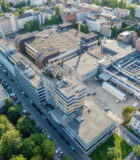Newsroom
Hier befinden sich alle wichtigen Informationen rund um unsere Ankäufe sowie unser Blog, der einen Blick hinter die Kulissen gibt.

Hier befinden sich alle wichtigen Informationen rund um unsere Ankäufe sowie unser Blog, der einen Blick hinter die Kulissen gibt.
